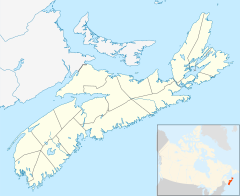Shaar Shalom Synagogue
| Shaar Shalom Synagogue | |
|---|---|
 The synagogue in 2019 | |
| Religion | |
| Affiliation | Conservative Judaism |
| Ecclesiastical or organizational status | Synagogue |
| Leadership | Rabbi Gary Karlin |
| Status | Active |
| Location | |
| Location | 1981 Oxford Street, Halifax, Nova Scotia, B3H 4A4 |
| Administration | United Synagogue of Conservative Judaism |
| Geographic coordinates | 44°38′43″N 63°35′58″W / 44.645304°N 63.599563°W |
| Architecture | |
| Groundbreaking | 1954[1] |
| Completed | 1955 |
| Website | |
| theshaar | |
The Shaar Shalom Synagogue (inscribed in Hebrew: עדת שער שלום, Adas Shaar Shalom on the corner of the building), is a Conservative synagogue located in Halifax, Nova Scotia.
The Shaar Shalom Synagogue was among the first Canadian Conservative synagogues to hire women in clergy positions and welcome same-sex partners as members.[citation needed]
History
[edit]It was founded in 1953 by a collective of families who were members of Halifax's Baron de Hirsch Synagogue who sought a community that would permit "family seating" (also known as mixed seating or the opportunity for men and women to sit together). They sought an egalitarian ideology that would permit women's political and ritual leadership.
The community has had professional leaders over the years, including Dr. Irving Perlin. Perlin was an obstetrician who served as a lay hazzan and mohel, and presided over weekly sabbath liturgies and ceremonial circumcisions.[2] The synagogue is a supporter of Camp Kadimah.
Many of the art pieces still decorating the synagogue were procured during David Jacobs' tenure from 1953-1957. The building that stands at the corner of Oxford St. and Pepperell St. was dedicated on October 31, 1955.
Rabbinic Leaders
[edit]- 1953-1957: Rabbi David J. Jacobs, an enthusiast of modern Jewish art[3]
- 1957-1961: Unknown[4]
- 1962-1964: Rabbi Emanuel S. Goldsmith
- 1965-1968: Unknown[5][3]
- 1969: Rabbi Dr. Max Wallach.[6]
- 1970-1974: Unknown
- 1975-1976: Rabbi Leo Heim[7][8][9]
- 1977: Unknown[10]
- 1983-1995: Rabbi Jacob Chinitz
- 1995-1998: Rabbi Pamela Hoffman (part-time, and later full-time)
- 1999-2000: Unknown
- 2000-2001: Rabbi Dr. Michael Goldberg, author of Why Should Jews Survive?: Looking Past the Holocaust Toward a Jewish Future (Oxford University Press, 1995)
- 2001-2010: Ari Isenberg-Grzeda (part-time, rabbinical students)
- 2010-2011: Catherine Clark & Joshua Rabin (part-time, rabbinical students)
- 2011-2013: Ari Isenberg-Grzeda (part-time, rabbinical student)
- 2013-2015: Rabbi Ari Isenberg-Grzeda (full-time)
- 2015-2016: Rabbi Irit Printz (part-time)
- 2016–2019: Rabbi Dr. Raysh Weiss (full-time Senior Rabbi) & Rabbi Jonah Rank (part-time, rabbinic educator position)
- 2019-present: Rabbi Gary Karlin (full-time)
References
[edit]- ^ "About". Shaar Shalom Congregation.
- ^ "N.S. doctor who delivered 15,000 babies dies". CBC News. 2 January 2017. Retrieved 20 January 2019.
- ^ a b "Shaar Shalom Congregation Dedication" (PDF). theshaar.ca. 31 October 1955. Archived (PDF) from the original on 25 December 2022. Retrieved 20 June 2023.
- ^ "Classifieds". No. XVI: 31. The National Jewish Post & Opinion. 24 March 1961. Retrieved 5 November 2018.
- ^ Anderson, R. J. (16 December 1967). "Some Call It Synagogue, Some Call It Shule". The Brandon Sun. The Canadian Press. Retrieved 3 March 2018.
- ^ Fingard, Judith; Guildford, Janet; Sutherland, David (1999). Halifax: The First 250 Years. Halifax, NS: Formac. p. 175.
- ^ Klein, Jeffrey C. (December 1975). "Shalom". Shalom. Channukah Edition. 1 (2): 25.
- ^ Heim, Leo (May 1976). "Israel, As I See It". Shalom. Israel Independence Edition. 2 (3).
- ^ Heim, Leo (December 1976). "The Message of Chanukah for Today's Youth" (PDF). Chanukah Edition. 2 (5): 6.
{{cite journal}}: Cite journal requires|journal=(help) - ^ Landau-Chark, Susan J. (2008). Community, Identity, and Religious Leadership as Expressed through the Role of the Rabbi's Wife (dissertation). Montreal, QC: Concordia University. p. 20.
- Conservative synagogues in Canada
- History of Nova Scotia
- Buildings and structures in Halifax, Nova Scotia
- Culture of Halifax, Nova Scotia
- Jewish organizations established in 1953
- Jews and Judaism in Halifax, Nova Scotia
- Synagogues in Nova Scotia
- Synagogues completed in 1955
- 1955 establishments in Nova Scotia
- 20th-century synagogues in Canada

